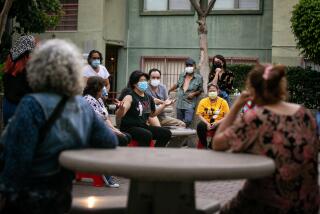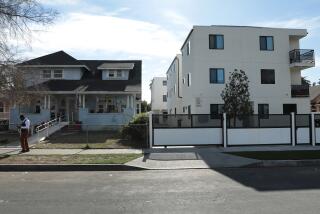Leiweke and the have-nots
Tim Leiweke has his finger in more pies than most Angelenos. Among many other things, his company -- AEG, with the initials standing for Anschutz Entertainment Group -- owns the Los Angeles Kings and is developing the $2.5 billion L.A. Live entertainment/hotel/office-space complex around the Staples Center, which it also owns. The company has benefited from some subsidies and beneficial political connections, which occasionally lands it in at least mildly warm water.
Leiweke came by The Times’ editorial board Oct. 15 for a little jaw-jaw about his soon-to-open Nokia Theater, about the controversial Figueroa street corridor, about his secretive boss Phil Anschutz, and about his concerns that a city polarized between haves and have-nots could erupt into a conflagration rather unhospitable to his new “campus” in south downtown. Some highlights from the conversation:
Jim Newton: Can I ask you something -- going back to when Staples was originally being designed and built, there was a big conversation then about the Living Wage, and if I recall correctly all the jobs at Staples are living wage jobs, right?
Leiweke: Everyone’s; I mean one of the things I’m most proud about -- and I mean, I have to admit, I’m a little burnt by the article on the Figueroa corridor because they really took aim at us on affordable housing. Well here’s the truth about affordable housing: We committed to affordabe housing, we committed to a 20% commitment towards affordable housing on all of our units that we were building before we ever went to City Council. We did it with the community. And then all the other developers got ticked off at us. We were revolutionary. We created this new affordable housing platform. If you go to the advocates on the Figueroa corridor, and in downtown Los Angeles, most of them -- not all of them, there are a few radicals that want more -- most of them will tell you: we were revolutionary in the commitment we made to affordable housing.
We’re all union. So when you go onsite and you see every worker on downtown Los Angeles and L.A. Live, we’re union. You go behind our stands of all our Levy concession stands at Staples or Nokia Theater, we’re all union. And I’m proud of it. Do we pay a premium? Yes. Do we put ourselves at a competitive disadvantage? Yeah. The Arrowhead -- or what do they call it now? The Honda Center -- is not union. So we lose evnts to the Honda Center. And I at times have trouble competing with them. [...] But we’re union. We’re for affordable housing, I’m for unions. You gotta negotiate, you occasionally have to make sure that you’re protecting the best interests in the investment and the money that we’ve put forth here.
But I’ve always believed at the end of the day, when it comes to giving people a decent wage, giving them a chance to put bread on the table and in particular giving them health coverage, that it’s a role that we’re all gonna have to be more focused on, because we as a company are very concerned about the gap between the haves and the have nots. [...]
Further. We quietly are very, very committed at getting involved in other things going on in the community. So we’ve given a lot of money back, and you know we don’t go run ads about it, we don’t go boast about it. But we’ve done our fair share, and it’s tens of millions of dollars, not millions--
David Hiller: You ought to run a few ads about it.
(Laughter)
Leiweke: We’re runing ads in your paper. You know sometimes, sometimes when I run ads in your paper I catch holy hell for running ads in your paper.
Hiller: Well, not from me.
Matt Welch: What’s keeping you up at night right now?
Leiweke: My hockey team. You know I-I I’m bothered by our hockey team because I wish we were better. I hope we do get better. [...]
This is a high-priority city for us now. Whether we like it or not, we’re here, we’re ingrained, and we have well over $2, $2 and a half billion invested in this community now.
Lisa Dillman: So backpedaling to something you said, how do you get Phil to go against his inherent nature of being secretive and quiet?
Leiweke: Well AEG is not about Phil, and amazingly it never has been. I think in the eyes of some, you know, maybe we shouldn’t have put that “A” in AEG. But the reality is this company’s not Phil, this company is Tim and Michael and Dan Beckerman [...] and the other 2,000 people who are sitting here working every day. AEG has a life of its own now. Phil’s our chairman, and I occasionally have to keep him happy. But you know Phil doesn’t sit around, Phil’s not headquartered in L.A., Phil doesn’t work at AEG, Phil doesn’t have an office at AEG, Phil’s not going to have a new office in our new corporate headquarters. He happens to be the money that built this company, and now as we’ve grown we’ve gone away from Phil money, and gone to traditional forms of money that we go out and borrow, and we have a lot of people that want to give us money to grow, because we keep on having success story after success story, and that builds a good track record for lending. And that means I don’t have to be nearly as dependent on Phil.
Now. Phil’s my friend, my mentor, my partner, my -- I still have a father, but if I had another father it would be him. And I’m sure he’d say if he had anyone that gave him more trouble than I do he’d have to adopt him as a son. So he is the lifeblood of our company, he is our leader. But AEG is being built by the people here, and we’re more and more independent every day from Denver, and we’re proud of that. It’s a good story.
Matt Welch: Are you involved in the newspapers?
Leiweke: No, thank God. I have no clue what the hell he’s doing there. You could quote me on that.
Matt Welch: I was gonna ask you when the Los Angeles is going to start....
Leiweke: You know I’m proud to say that we’re independent of that division, because that’s not an area of experties, an area of desire, and believe it or not, we’d rather be covered by newspapers, we’d rather buy ads in newspapers, we’d rather not own ‘em. We’d rather let Phil figure that one out. [...]
Matt Welch: What are your big sort of frustrations or worries about any kind of public policy thing affecting downtown right now? As you see it sort of develop and boom and get more interesting, what’s kind of bumming you out about it?
Leiweke: The gap between the haves and the have-nots. We all better figure this one out; if we don’t, there’s gonna be a day of reckoning here that’s not going to be pretty.
We cannot have the poverty level and housing getting to a point where we lose 50% of our community.
Education. Personally? I think people can go spend all the money they want on L.A. Unified, but I’m frustrated with L.A. Unified because I can’t figure out how anyone’s ever going to fix it. So we love Green Dot. We’ve already made a million-dollar commitment to Green Dot for the charter school that they’re going to put on our end of town. I hope L.A. Unified gets worked out, but I worry about L.A. Unified. I mean is that beast so big and so far gone that no one’s ever going to be able to figure it out? We cannot, you know -- tell me how Green Dot can graduate 97% and L.A. Unified graduates 40%? Is it management? Is it vision? Is it bureaucracy? Is it money? What is it? Something’s wrong there, and we’ve got to figure that one out.
Because we can’t keep on dumping kids, we can’t go back to kids and tell them, “You have no hope in your life, so join the gang.” The reason kids join gangs is because they don’t want to work at McDonald’s for $8 an hour. And so we’ve got to figure this one out, or else we’re going to lose a large portion of our population base before we ever even get to that population base. So I’m worried about our schools.
I’m worried you know, here were are in a city that is, what, four times the size of New York? And we have a fourth of the police officers. There’s something terribly wrong with that. We as a community need to put a higher priority on safety. And it means that we’re going to have to give them money. And I’m disappointed that we didn’t get the last bond issue passed with both the city and the county. But my God, when you need two-thirds of the people to vote for more taxes, that is a huge obstacle that we have to overcome every time we try to create more of an infrastructure.
But to me, it’s the Big Three; uh, Big Four: It’s where do you live, where do you have a life, where do you find affordable housing? How do we educate ‘em? How will we fix our transportation systems, and how do we ultimately provide people with a safe community? And in L.A. we got to get better at all four; we do not have good answers on any of those four yet. But I think we’re headed in the right direction, I think our mayor -- when he’s focused -- is good at caring. We’ve just got to keep him focused. [...]
We’ve got to solve those four things or we got a campus, and we have 2,000 employees that are going to live in a community that suddenly becomes unlivable. And we can’t go back to those days in L.A. We’ve been there and done that.






